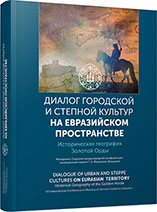
The Hoard of Juchid Coins (Second Quarter of the 15th Century) from Alexeyevsky District of Tatarstan: to the problem of the 15th-century Bolgar Ulus mints
Клад джучидских монет второй четверти XV в. из Алексеевского района Татарстана. К вопросу о монетных дворах Булгарского улуса в XV в.
Keywords: Middle Volga region; 15th century; Bulgar vilayet; Bilyar; Jochid numismatics; hoard
The find of a new 15th-century hoard of coins from Bilyar area is discussed. Analogies to other numismatic complexes of the region are offered. The method of comparison of the finds of coins and their types makes it possible to draw a conclusion about the existence of a mint that had emitted silver coins in the second quarter of the 15th century.
More...